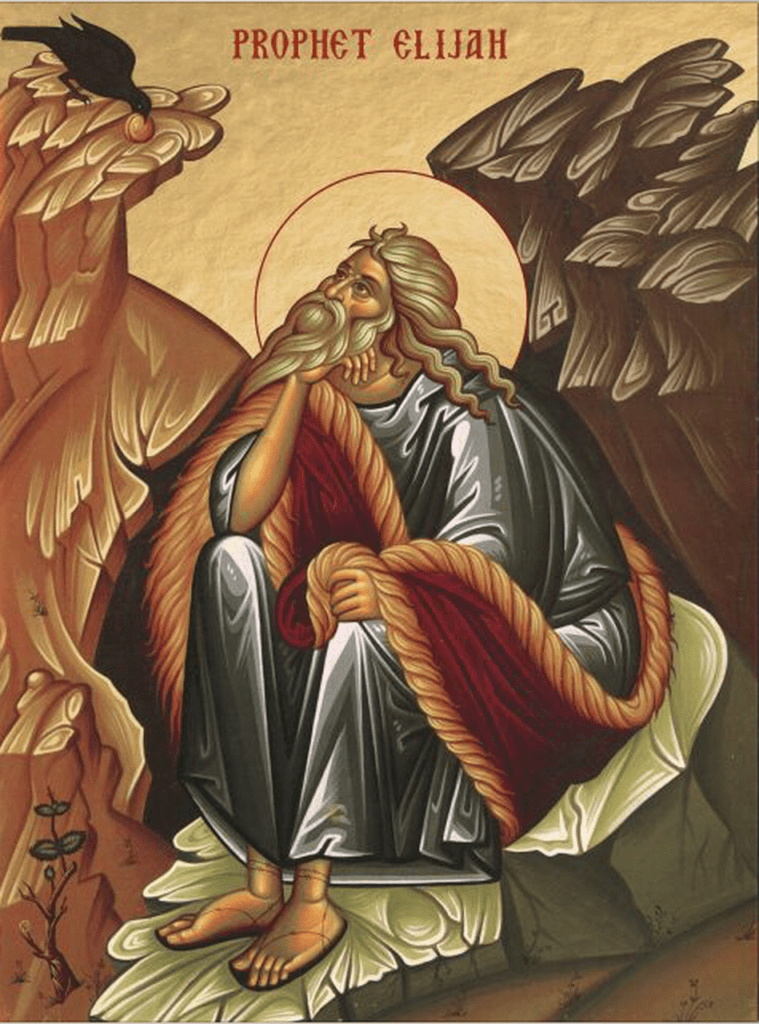2024 and the Lost Christian
12/25/2023We stand at the precipice of another year as if we were looking down into a winding cavern from the trailhead. Standing here on Day 1 of 2024, we cannot see much, for the canyon floor is covered with thickets. Downward we descend on a path obscured by tangled growth both foreign and familiar to us, things planted long ago which are coming to both bitter and sweet fruition at the same time, and commingled so as to make it impossible to uproot the one without destroying the other.
Though we find the path at canyon bottom, many voices call to us from hidden places among the trees, voices asserting, “Listen to us and you will not be lost.”
But we reply, “The voice of our Shepherd is enough. We know His voice. He calls us each by name and we each respond. That is enough.”
“No!” counter the voices in the shadows. “It is not enough. Follow us and you will not be lost.”
But we say, “We would rather listen to our Lord and feel lost than listen to your voice and lose the Way. For it is written:
It was by faith that Abraham obeyed…He went without knowing where he was going.1
We are known by Him in the unknown of this canyon.”

Three Voices
What are these voices? Some are by nature so alien to us they contain no allure. Beyond a short season of infatuation or intimidation, we no longer pay heed to them, for we have become “foreigners and nomads on the earth”2 to such a degree that the only effect those voices have on us is to reinforce our desire to “confidently look forward to a city with eternal foundations, a city designed and built by God.”3
But there are other voices that remain appealing at the floor of the canyon, where birds-eye views are hard to come by and the sense of lostness palpable. Here are three of them:
- “Follow us and be complete.”
- “Follow us and be correct.”
- “Follow us and be current.”
The Appeal of Being Complete
A voice calls out, “Our system, our ideology, our coherent set of explanations — clothe yourself with these and you will lack nothing. You will be safe, certain, and firewalled against your fears. We supply knowledge and insight. We supply a sense of control. Join us!”
The Appeal of Being Correct
“We see and know accurately,” calls out another voice. “We have flattened out all mystery and replaced it with certainty. We have named each thing accurately, labeled each thing precisely. Join us and you will be assured of no mistakes, no errors. Clothe yourself with our correctness. We will not fail you on the trail.”
The Appeal of Being “Current”
“Rally to our relevance!” another voice declares. “Our impact is sure and our effectiveness total. Join us and you will not be left behind. Close ranks with us in matters of culture, social issues, and the timetable of the End. Clothe yourself with keeping up and you will not be ashamed.”
Now if we do not join the chorus of one or more of these voices in this year, others may call us into question. “Are you truly effective?” they may ask. “Are you truly loyal?” Or even, “Are you truly a believer?”

These questions are not unlike the ones the prophet Elijah faced. He was a human just like us4, and if human, then he, like us, felt challenged by these voices and at times at a loss for how to reconcile their compelling arguments with the fire that burned in his heart, a fire essentialized in the following words, which, though a Hebrew oath, in the mouth of the prophet speak not of oath but of deep friendship:
“As the Lord of hosts lives, before whom I stand…”5
And, for all the voices that shook and assailed him, Elijah ultimately listened to only one voice, a voice so still and so small that he himself had to become very still and very small to hear it; as if his heart and mind had been converted to the flat, unleavened bread of the Passover Lamb sacrifice.
This was a deeply vulnerable thing to do, but, as we can see from the course of his life and its outcome, it was also the most beautiful and ominous thing to do. It is our turn to pick up what Elijah has modeled for us.

There are some (I among them) who identify with the Lord and His people but do not readily identify with a specific denominational brand, movement, or logo. Instead, we cherry-pick what seems helpful from among the many orchards planted in His name. Like Elijah, we are completely folded into both the falling-apart of our world and the long journey of the believers through it. And yet, like Elijah, we do not quite tow anyone’s party line.
The Lord, seeing that gap, mercifully feeds us through homely, unpretentious means. He sends us our version of Elijah’s ravens, who scavenge the surplus of kings’ tables for our supply6. And, as with Elijah, He leads us to new places of grace when the gorge we shelter in runs dry. He makes sure we know that what He said of His care for flowers and sparrows is doubly true for us, His image bearers, square-peg status notwithstanding.

This square-peg status — this sense of being a lost Christian — takes place when we readily enjoy elements of various traditions and cultures and yet cannot fully identify with any specific one of them, for a counterbalancing dynamic is at work in us, the work of the Spirit, which cultivates us as set apart ones, as being “in” something but not “of” something so that we are a blessing to as many people as possible, both those who know where they are going and those who do not.
Lost but Not Isolated
However, such a lost disposition does not mean we are isolated. Elijah was part of a company of friends, what the modern Greek person would call a parea [pah-rE-a]: “the family you choose.”7 This is a circle of friends we walk with (and, fortunately for some, relatives too). We walk with them freely and wholeheartedly, humbly acknowledging we do not know the future; humbly acknowledging we do not fully know our own hearts; and humbly acknowledging that virtually all things — including our own lives — are transitory vapors.
And if we ever do feel alone, let us return to Elijah’s experience for encouragement. What did our Lord say to him on Mount Horeb when he asserted he was completely alone?
“I still have 7000 people in Israel who have never bowed down to Baal or kissed that idol.”8 Paul, the battered apostle who spent a night and a day adrift in the open sea like living driftwood, paraphrases to us this assurance: “The Lord knows those who are His.”9
Elijah, like Paul lost at sea, was not alone, nor would he ever be. Nor will we. In the Lord Jesus, the drifting compass needle continually returns to one True North: we are irrevocably adopted sons and daughters, deeply loved, genuinely enjoyed, and fully cared for.
In light of these things, let us therefore cultivate a heart that longs for Him, a heart that is honest, humble, and walks with a homely home community of believers.

Honest
Honesty means living as one integrated self both on and offline, and such a self is in constant need of grace since all the props of dissimilitude are gone. This is costly (I know full well), for it risks the loss of position, possession, advancement, and reputation when you tell people what you actually do and what you actually think. There is no glamor in such a way of life, but there is grace in it. For grace flows within the riverbanks of truth.
One simple, immediately accessible way to receive grace is to confess sins. My friend Father George, an Armenian priest serving in Jerusalem’s St. James Cathedral and Church of the Holy Sepulcher, says: “We who are spiritual leaders are constantly making a way for grace to be given to others. How then do we get grace for ourselves? By confessing our sins to others.”
Humble
Let us contemplate humility by considering several contrasting images.
There are those who wrap the Nicene Creed around their middle finger, proud of their resistance toward many things. Their Scriptures are locked and loaded and dyed in the colors of their favorite flag. Their attitude speaks louder than the sacred truths they clothe themselves in. But we are not of that spirit.
There are those who wrap the Nicene Creed around their pointer finger, eloquently accusing others of their errors. Their Scriptures are organized in the shape of the Sanhedrin with the rest of us on trial. Their attitude speaks louder than the sacred truths they clothe themselves in. But we are not of that spirit.
There are those who wrap the Nicene Creed around their thumb, affirming many things. Their Scriptures are tied like captives to chairs and permitted to speak only when convenient. Those of this spirit fulfill the word associated with Eberhard Arnold, who resisted Hitler in the 1930s and prophesied to the German church this warning: “Love without truth lies.”10 But we are not of that spirit.
Instead, we acknowledge that we are not the center; the Lord is. And our perspective is not the center, no matter how truth-informed, compassion-saturated, and revelation-enriched we may deem it to be (and it may very well be).
Now let us consider humility in the example of Thomas Aquinas, a man of such caliber that the pope of his time looked to him for help in unifying the church; mystics honor him as a role model (there are documented accounts of him occasionally levitating in prayer), and secular scholars consider him one of the greatest philosophers of the Western world. He authored the encyclopedic Summa Theologica, an attempted comprehensive overview of the Faith, which he never finished.
Why did he not complete it? Because, while in routine worship with his home spiritual community in Naples, Italy, he encountered the Lord in visions that left him at a loss for words. When the brother who wrote down his brilliant dictations urged him to continue his vast work, how did Thomas reply in light of the glory he had seen?
“…all that I have written seems like straw to me.”11

Homely Home Community
If we truly desire to know that same Lord of glory Thomas saw in Naples and John beheld on Patmos, we identify with our local community of believers just as they did, regardless of how lonely our journey seems to ourselves and regardless of how homely the community may appear. We recognize that both the weak and the strong of a specific people in a specific place form a dwelling for our Lord, and that we have a part to play in living out the Sermon on the Mount among them. That dwelling may be only two or three or it may be two to three hundred12, but whatever the case, this eclectic gathering, congregation, local church, or discipleship group is, in essence, our ecclesia: our home community.
We are aware of our home community’s imperfections. We are aware of our ways that potentially cause others sorrow if we do not mature. We are aware that all of us have either inherited or invented traditions, even those of us who rename things in the hopes of avoiding the errors of those who preceded us. We are aware that we have inherited the fallout of fractures in the Body of Christ, and we beg our Lord that during our turn on the watch we will not contribute to further schism, but rather, somehow help restore the spiritual city at whatever place among the ruins we find ourselves. We are aware that everyone is a work in progress — even as we ourselves are.
Now some would say, “Well, then, join us, for we have laid aside traditions!” Such a statement lacks maturity and forgets that the word “tradition” is a neutral term we fill with meaning. As humans we inherit the patterns handed down to us — for that is what the word “tradition” means, something handed down. We have only three choices with what is handed down: to either continue it, modify it, or replace it. There is nothing outside of these three, so integrated are they into our nature.
Therefore, although it may be true that, in protest to a certain tradition, we discard it, we nevertheless will be compelled by the vacuum created by the absence of the pattern rejected to create a new pattern in its place. It is therefore futile to be solely preoccupied with perfecting patterns. Rather, in the context of whatever patterns constitute our community’s traditions, we must be preoccupied with one thing only: practicing the Way.

Thus, as we seek to practice the Way in the context of our homely home community, we seek to do it well. And to do it well, we pray earnestly that we may walk with those who
- speak the truth in love
- walk in grace and truth, and
- worship in spirit and in truth
For if we find people such as these — or rather, if the Lord entrusts us to people such as these — then we will not stray far in our journey. Though “lost” in terms of comprehending Christendom and our place in it, nevertheless we will be, as Paul describes, “found in Him.”13 And that is enough. Let the Master Builder, therefore, place us, the living stones, each where we belong as we walk with the other living stones in ongoing fellowship among a specific people in a specific place.
Moreover, if we do the things we have reflected upon above, we may discover a surprising dynamic beneath all the traditions: that faithful followers of Jesus have always been alive and well across many places and all eras, people who have been loyal to the Lord — sometimes with the aid of their traditions, sometimes in spite of them — collectively forming one spotless Bride for whom our Lord shall return at the resurrection.
Some call this dynamic “the torch of the testimony” or “the pilgrim church.” C.S. Lewis calls it “the great level viaduct which crosses the ages and which looks so high from the valleys, so low from the mountains, so narrow compared with the swamps, and so broad compared with the sheep-tracks.”14

What we find, then, is that being a lost Christian is a clue that we are, perhaps, not far from that viaduct Lewis speaks of, that blessed conduit through the thickets that many others before us have found and many others after us will as well.
When that happens, we will ask ourselves, “How did I not see this viaduct from the top of the canyon?” The answer is that only seekers find it. And while seeking, we may seem lost in the immediate sense described here, but, in the ultimate sense, we discover we are not lost at all. We discover that we are, in fact, the kind of wanderers J.R.R. Tolkien imagined when he wrote these words:
All that is gold does not glitter,
Not all those who wander are lost;
The old that is strong does not wither,
Deep roots are not reached by the frost.
From the ashes a fire shall be woken,
A light from the shadows shall spring;
Renewed shall be blade that was broken,
The crownless again shall be king.15
Let the poem of that sage also be a prophecy; fresh, unleavened waybread, lembas for our journey as we descend into the canyon of this year and wander through it, holding onto hope, walking by faith, and doing everything in love. For a light still penetrates the thicket at the canyon floor, a light assuring us of the return of the King, who says to us, “Behold, I make all things new!”16
If we walk this way through the coming year, then the words of the Septuagint version of Psalm 34:4 may be fulfilled, when, to our surprise and in spite of all that rudely bursts upon us from behind the branches, we turn out to be less afraid. For it is written regarding the canyon of this year which we must pass through:
“I sought the Lord diligently, and he hearkened to me, and delivered me from all my sojournings.”17

© Kurt Mähler
- Hebrews 11:8 (New Living Translation) ↩︎
- Hebrews 11:14b (NLT) ↩︎
- Hebrews 11:10 (NLT) ↩︎
- James 5:17 ↩︎
- I Kings 18:15 (English Standard Version) ↩︎
- I Kings 17:2-6. The Septuagint (or “LXX”) version adds the detail that the ravens brought “loaves of bread” in the morning and portions of meat in the evening. ↩︎
- Thank you, Mason Hooper, for equipping me in this. ↩︎
- I Kings 19:18 (Easy-to-Read Version) ↩︎
- 2 Tim 2:19 (NLT). The reference to Paul being lost at sea for about 24 hours is from 2 Corinthians 11:25. ↩︎
- The full quote “Love with truth lies, but truth without love kills” is a paraphrase of Arnold’s words, “Wer seinen Bruder ohne Liebe zurechtweist ist ein Mörder.” [“Whoever corrects his brother without love is a murderer.”] Arnold’s son Heini recounts the original quote and its associated paraphrase on page 157 of his work Leben in der Nachfolge ↩︎
- In the Latin: mihi videtur ut palea ↩︎
- According to the theory of Dunbar’s Number, humans are designed to flourish in communities of about 150, for up to about that number all can know one another well and leadership can care for each one well. ↩︎
- Philippians 3:9 (New International Version). The NLT interprets the Greek “and be found in him” as “and one with him.” ↩︎
- Here is the quote in context from Lewis’ preface to John Behr’s translation of On the Incarnation by Athanasius:
“We are all rightly distressed, and ashamed also, at the divisions of Christendom. But those who have always lived within the Christian fold may be too easily dispirited by them. They are bad, but such people do not know what it looks like from without. Seen from there, what is left intact despite all the divisions, still appears (as it truly is) an immensely formidable unity. I know, for I saw it; and well our enemies know it. That unity any of us can find by going out of his own age. It is not enough, but it is more than you had thought till then. Once you are well soaked in it, if you then venture to speak, you will have an amusing experience. You will be thought of as a Papist when you are actually reproducing Bunyan, a Pantheist when you are quoting Aquinas, and so forth. For you have now got on to the great level viaduct which crosses the ages and which looks so high from the valleys, so low from the mountains, so narrow compared with the swamps, and so broad compared with the sheep-tracks.”
↩︎ - The poem is “The Riddle of Strider” in Tolkein’s The Fellowship of the Ring, where it appears as a witness that the homely Ranger assisting the Hobbits is actually the rightful heir of the kingdom of Gondor. ↩︎
- Revelation 21:5 (New King James Version) ↩︎
- Lancelot Brenton’s English translation of the Septuagint’s Psalm 33:4, which in most of our modern translations is Psalm 34:4. The Septuagint preserves the tradition that the phrase “delivered me from all my fears” of the Masoretic Hebrew scrolls can also be “delivered me from all my sojournings” [ασῶν τῶν παροικιῶν μου]. The phrases are two facets of the same priceless diamond. ↩︎

thank you Kurt, for being willing and vulnerable to share the words of truth…truth from scripture: undying….unfading….unending…relentless in its pursuit, committed to our freedom. But, also, the truths of where you are, how you feel and envision and imagine and think and reason and dream and pray…..it makes the lonely journey much less so as we share the reality of His calling and the deep desire that Words awaken in us. We need this daily awakening and faith reminding us that we are not alone, we are not forsaken and we are not destined to fail because Love never fails. He holds us securely so that we can truly live, glorifying Him. When all is said and done that is all we ever really wanted: to allow our hearts to be stretched into eternity, ever-expanding with more and more of His love. Psalm 119:32
Thank you for giving voice to the things that are not so clearly defined and understood….praying for you, your family and the entire Body of Christ that we might grow strong in the grace that is in Christ Jesus.
Thank you!
Excellent
Kurt! Truly Inspiring and Touches The Deep Recesses Of My Heart!